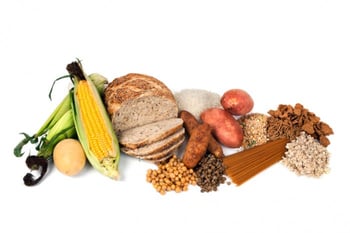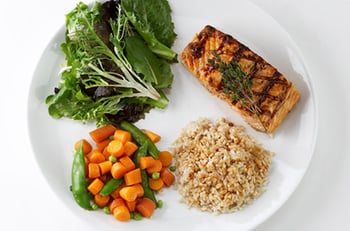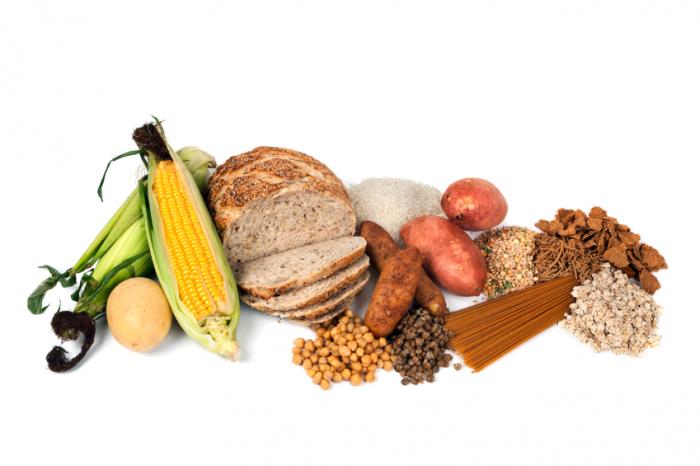 Christina: This is Christina with the DVCC and today I’m joined with Greg, trainer at the DVCC’s Bedford location, to discuss the role of carbohydrates in our lives.
Christina: This is Christina with the DVCC and today I’m joined with Greg, trainer at the DVCC’s Bedford location, to discuss the role of carbohydrates in our lives.
Now Greg, we’re here today to talk about the importance of carbohydrates and ever since the famous Atkins diet, that’s become a dirty word. But are carbohydrates really bad for us?
Greg: No, not at all. Carbohydrates can play a very important role in the body and, in
my opinion, shouldn’t be neglected. The only difference between them and protein and fats is that protein and fats are essential to health.
Carbohydrates technically aren’t, so I think they get a bad reputation because of that and also because most of the foods you would associate people eating that are bad are generally high in carbohydrates. But no, they’re not bad.
Christina: So we shouldn’t avoid them completely then?
Greg: Depending on your goal, they can be removed or increased accordingly; unlike the protein and fats, they are a lot more interchangeable. So you can easily survive without them or you can easily survive with loads of them, so they are a bit more flexible than the other two.
Christina: What do carbohydrates do for us, if we’re eating them in the right quantities?
Greg: Three main reasons really; one is to replenish your glycogen stores; within your muscle and liver you actually have a store of carbohydrate called glycogen. When you exercise, these are used up by the muscles, so when you’re eating carbohydrates, post exercise mainly, you are going to replenish these which is going to help muscle recovery and performance.
Second is that your brain would primarily use glucose, or sugar, as an energy source, so having carbohydrates present in your diet will help keep you mentally sharper because you’re going to get the glucose from the carbohydrates.
Finally, in terms of burning fat as a fuel to the body, you actually need carbohydrates to start off the overall respiration process in which that’s going to happen.
Like I said before, you can survive without them but they do have very important roles.
Christina: What’s a good way to get the right amount of carbs in our diet – not too many, not too little?
Greg: This really depends on your goal, but if we took an average DVCC client, which is someone who is looking to drop some body fat, then the easiest way to make sure you’re not over consuming but you are getting enough would be just to eat them at the right time, so around training. For example, the post workout meal could have between 50 and 100 grams of carbs in it; that will generally keep you on track.
Christina: Now there has been a lot of talk about good carbs and bad carbs; can you explain a bit about that? What are good carbs, for example?
 Greg: Good carbs would be the ones which are low in sugar and have a complex structure, so they don’t produce a very large insulin spike and then as a result your blood sugar doesn’t go up and down quickly; it will be a much more stable decline once you’ve eaten the carbohydrate.
Greg: Good carbs would be the ones which are low in sugar and have a complex structure, so they don’t produce a very large insulin spike and then as a result your blood sugar doesn’t go up and down quickly; it will be a much more stable decline once you’ve eaten the carbohydrate.
Christina: Ok – what about bad carbs, what do those do?
Greg: Generally you’re looking at things high in sugar. As an example you’re looking at all kind of junk food, like biscuits, cake, all that kind of stuff that is high in sugar, high in bad carbs. What happens when you eat these is you’ll get a large insulin spike because your blood sugar has gone up and then it will quickly come back down so your blood sugar will drop lower and you’re more likely to store that as fat.
Christina: Can that leave you feeling tired?
Greg: Yes actually, it can. There is also something called insulin sensitivity, insulin resistance; basically what that means is how well your body responds to the release of insulin. So if you’re quite insulin resistant, which is common in a lot of overweight people, and you ate a large carbohydrate based meal, you are going to produce more insulin than someone who is perhaps not overweight, and this is going to drop the blood sugar lower and you’re going to feel more tired.
Christina: One step further, what are complex carbs? I’ve heard a lot about those as well.
Greg: This relates to how insulin works, so I just want to describe that first. If you eat any carbohydrate your blood sugar will rise; as a result your body detects it and then releases a hormone called insulin. Insulin is what is then going to control your blood sugar.
If you eat a simple carbohydrate, you get a quick release of insulin, your blood sugar goes up quickly once you’ve eaten it and then it comes down quickly as well.
Whereas if you eat a complex carb, you’ll get a spike of blood sugar but a spike in insulin as well, but they will come down slowly over time because the carbohydrates take longer to digest by the body. So it’s much more of a slower, more stable process; your blood sugar won’t be going up and down all the time.
Christina: So it’s releasing energy slowly throughout the day?
Greg: Yes
Christina: You mentioned eating carbohydrates after your workout; what’s the best way to eat them? What are the best types of carbohydrates to eat, for example I should be avoiding chips I would imagine!
 Greg: In terms of best time, you’re looking at post workout. And best types, foods that are complex that we’ve already talked about, for example sweet potato, quinoa, ground rice; they would be the best things to eat post workout.
Greg: In terms of best time, you’re looking at post workout. And best types, foods that are complex that we’ve already talked about, for example sweet potato, quinoa, ground rice; they would be the best things to eat post workout.
Having said that, there isn’t much point to focus in on nutrient timing if you are then going to eat high sugar food in the evening. So if you’re going to eat a bowl of ice cream in the evening, there’s not much point in focusing on eating good carbs during the day after your workout, because it’s not going to make any difference – the ice cream is going to cancel everything out.
Christina: So one bowl of ice cream can throw everything off keel?
Greg: Depending how big the ice cream is, but yes, it’s not going to be ideal. I would focus on limiting the ice cream as a priority over getting some carbs in post workout.
Christina: What are the problems that people experience if they do cut carbohydrates out completely?
Greg: Initially, people can feel quite tired because they’re used to using their carbohydrates, especially mentally. So you can feel a bit of fatigue and a bit lethargic.
However, normally the body will adapt to it, so there are things called ketogenic diets, which have some kind of benefits for health, but they’re not necessary for most people. The reason being for that is it’s very hard to stick to and you want something that is going to be sustainable. Initially they can be very difficult; if you do manage to stick with it, it’s also very difficult to carry on long term, so it’s probably – in my opinion – better to just to keep a little bit in there.
Christina: Would anything happen, for example, if somebody is on a very low carb diet and suddenly they ingest a lot of carbohydrate at once?
Greg: I don’t think anything necessarily really bad would happen. You’d get a large spike of blood sugar and probably then a large release of insulin and then feel more tired after eating them, but it wouldn’t be really bad.
Christina: It wouldn’t be the worse thing in the world?
Greg: It depends what carbohydrate it was; if you were eating loads of sugar you’d probably store some body fat as well. But it’s not going to make you ill or anything, it’s just not going to be ideal.
Christina: What about supplements, do you think that they’re important as well?
Greg: Yes, supplements are always important; they’re always just supplementary but in regards to losing fat and building muscle and in relation to carbs they can definitely be beneficial. I guess the one that would be most beneficial would perhaps be Omega 3 fish oil because it can help increase your insulin sensitivity, which means you’ll be able to use your carbs more efficiently, basically.
So I would say that’s probably the best one, in relation to carbs.
Christina: Ok, great. So then if you can sum up in a sentence, carbohydrates are…?
Greg: Not essential but very useful. I wouldn’t eradicate them completely, but depending on your goal, cut down or increase where appropriate.
Christina: Perfect! Do you have anything else to add?
Greg: Just to make sure that whatever you do regarding nutrition and your goal, just make it sustainable.
You might read one day that ketogenic diets are the best for you, but if you can’t stick to it for more than a month then what’s the point?
Christina: Great, ok – thank you very much Greg.
The DVCC has centres in Bedford, Milton Keynes, Northampton, Hitchin and very shortly St. Albans and Central Bedfordshire. So if you’ve been listening to this interview and you’d like to find out more about how the DVCC can help you, then please book an appointment for a DVCC 60 minute discovery call, at www.theDVCC.com/signup.









